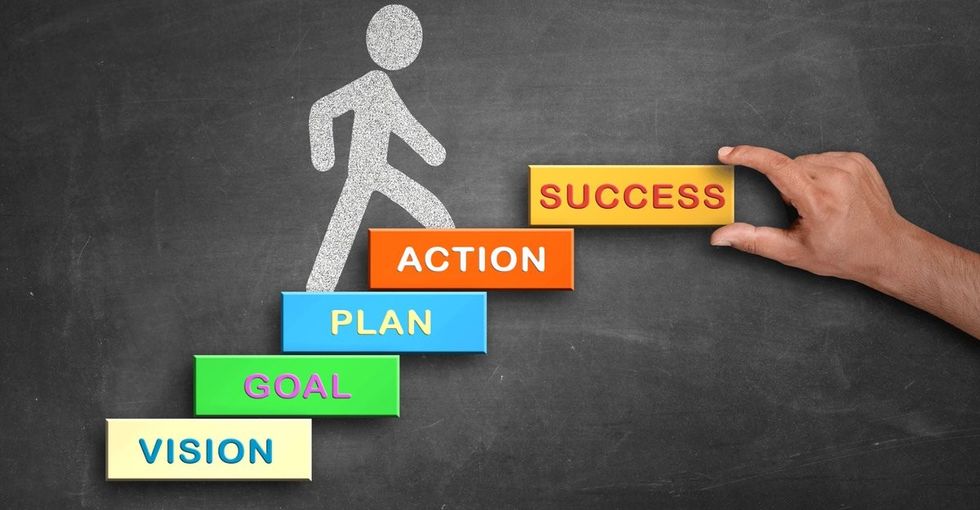bright ideas
The 21st century has brought great new opportunities for entrepreneurs. The digital revolution has completely changed the way we live -- and the landscape for aspiring CEOs and innovators.

However, the world is also moving faster than ever, and the competition is thick, so you have to gain every advantage you can get to turn your passion or idea into a sustainable business.
Entrepreneurship requires an unvanquished spirit of curiosity, an openness to learning, a letting go of OldCo so you're free to create NewCo. – Michael E. Gerber
This is where this guide comes in. We've outlined the 15 best resources on entrepreneurship to help you acquire the tools and knowledge you need to start your entrepreneurial journey (and keep it going). Whether you're looking to work remotely as a freelancer or want to turn your passion into a career, the resources below will help you get there.
1. Personality Traits that Successful Entrepreneurs Value More than all Others
If you want to know what the absolute most important traits and skills are to develop as an entrepreneur, look no further. If you’re an aspiring entrepreneur, this will tell you everything you need to know about what makes a successful entrepreneur tick.
Read here: 5 Personality Traits that Successful Entrepreneurs Value More than all Others
2. How To Find Your Passion
If you haven’t yet found your calling, it’s important to do that first before venturing off into any long-term business effort.
That’s not just because you shouldn’t settle for anything less than doing what you love (after all, why become an entrepreneur if you’re doing that?), but also because you’ll never be able to maintain the energy and motivation to get passed tough challenges without this passion to drive you.
Read here: How To Find Your Passion
3. Dangerous Misconceptions About Entrepreneurship That You Should Know About

If you’re relatively new to entrepreneurship, there are some dangerous misconceptions that can hold you and your entrepreneurial efforts back which won’t be immediately obvious. Learn what those misconceptions are and how to keep from falling victim to them by reading this.
Read here: Dangerous Misconceptions About Entrepreneurship That You Should Know About
4. How to Build a Brand in the Digital Age — An Entrepreneur’s Starter Guide
With social media, building a strong brand is more important than ever before. But if you don’t know anything about what it takes to build a brand, don’t worry, this will help you figure out everything you need to get started.
Read here: How to Build a Brand in the Digital Age — An Entrepreneur’s Starter Guide
5. Things You Need to Know If You Want to Be an Entrepreneur
If you want to be an entrepreneur, there are a few things that you really need to know. I can’t stress these points enough– if you have dreams or plans of becoming (or are already) an entrepreneur, you need to read this sooner than later.
Read here: 6 Things You Need to Know If You Want to Be an Entrepreneur
6. The 3 Questions No Entrepreneur Wants to Ask (but You Must)
If you want to build a long and fruitful self-employed career, there are three critically important questions you must ask yourself.
This is yet another thing you really can’t put off, as it affects your entire path through entrepreneurship in several critical ways. But, the good news is, if you can be ready for these things ahead of time, you’ll be far better prepared.
Read here: The 3 Questions No Entrepreneur Wants to Ask (but You Must)
7. With Grace and Grit: A Guide to Sticking it Out for Entrepreneurs

If you haven’t already figured it out yet, entrepreneurship is tough -- really tough. You need to have the right amount of toughness to get through the inevitable challenges you’ll face along the way. Building resilience is key.
Read here: With Grace and Grit: A Guide to Sticking it Out for Entrepreneurs
8. Why Entrepreneurship Is an Effective Path to Happiness (and How to Get Started)
Aspiring business leaders have more opportunities than ever, but the path to success is also very different from what it used to be.
People who might not otherwise have considered themselves entrepreneurs are now deciding to take this path because starting a business gives them the opportunity to do what they love and live on their own terms.
Read here: Why Entrepreneurship Is an Effective Path to Happiness (and How to Get Started)
9. Entrepreneurship and the Architecture of Success: Setting Smart Long-Term Goals
Entrepreneurship is a long-term game. If you hope to find success in your chosen endeavor, you need to have a well-defined plan and the structure to make that plan a reality.
Read here: Entrepreneurship and the Architecture of Success: Setting Smart Long-Term Goals
10. Hacks Highly Successful Entrepreneurs Use to Stay Laser-Focused
Are you a seasoned entrepreneur looking for some extra tips for staying focused? Making your vision a reality is hard and requires a laser focus over a very long period of time. Fortunately, there are some simple hacks that can help you keep your eyes on the prize.
Read here: 5 Hacks Highly Successful Entrepreneurs Use to Stay Laser-Focused
11. The Best Free AI On The Market
This seems to be a more brazen suggestion as there is all sorts of controversy surrounding this new TOOL that has been released. However, technology is constantly improving and just as the phone became an essential part of life, so will AI. If you want to truly level up your game you need to learn how to do the unexpected before its expected of you.
Read here: How to efficiently make prompts and utilize artificial intelligence
12. Trello: The Perfect Organizer
Stay organized and boost productivity with Trello! Manage projects, collaborate with your team, and track tasks effortlessly. With its easy-to-use interface and powerful integrations, Trello keeps everything in one place, helping you work smarter and faster. Try it today!
Read here: The main site and number one recommendation for team organization

13. Canva: Make Advertisement Easy
Create stunning visuals effortlessly with Canva! Design professional graphics, social media posts, presentations, and more—no design skills required. With easy-to-use templates and powerful tools, Canva helps you bring your ideas to life. Start designing today!
Read here: Make Advertising Easy And Effortless
14. Google Analytics: It's the perfect observer of success, see where you struggle and where you thrive
Unlock powerful insights with Google Analytics! Track website performance, measure traffic, and understand user behavior to optimize your online presence. Make data-driven decisions and grow your business with ease. Start using Google Analytics today to boost your success!
Read here: Google Analytics Lets You Look Into Your Weak Points And Work On Them
15. Hootsuite – Manage and schedule your social media posts across multiple platforms in one place.
Simplify your social media management with Hootsuite! Schedule, track, and manage posts across multiple platforms all in one place. Save time, increase engagement, and streamline your strategy with powerful analytics. Try Hootsuite today and elevate your social presence!
Read here: Schedule Your Posts And Manage Your Releases, Get To The Top And Stay There

































